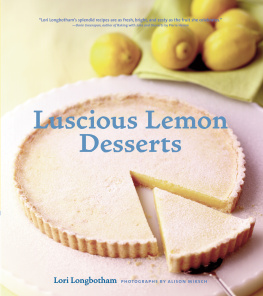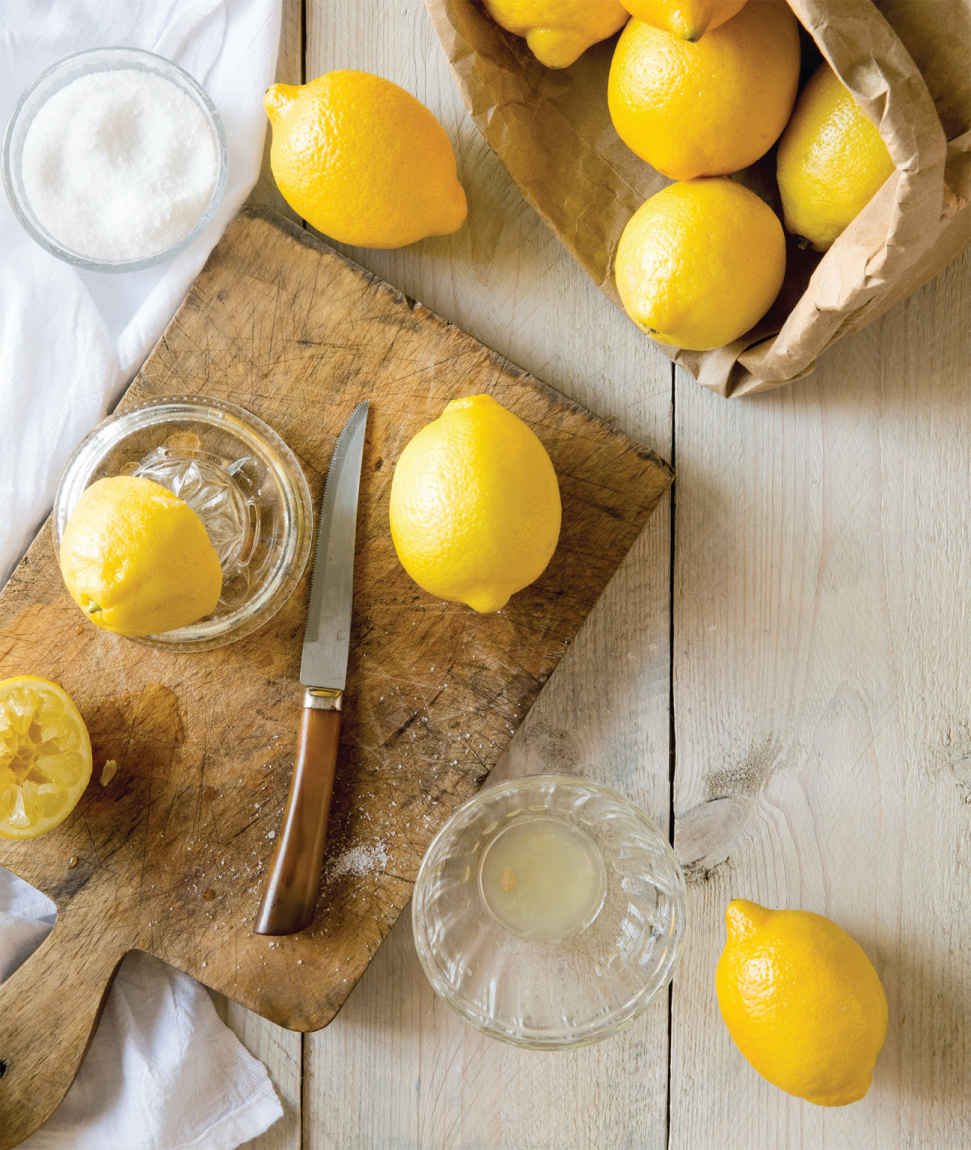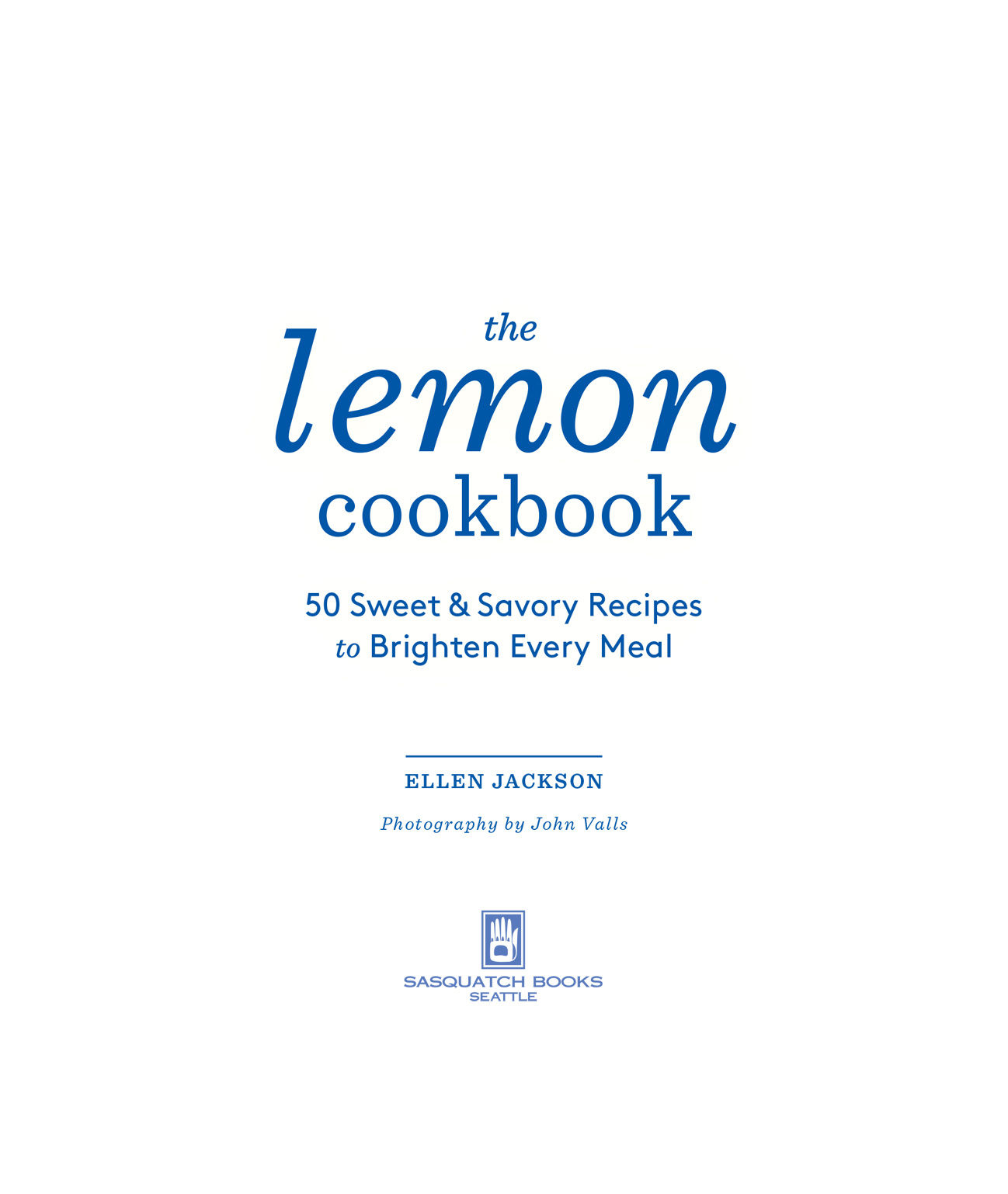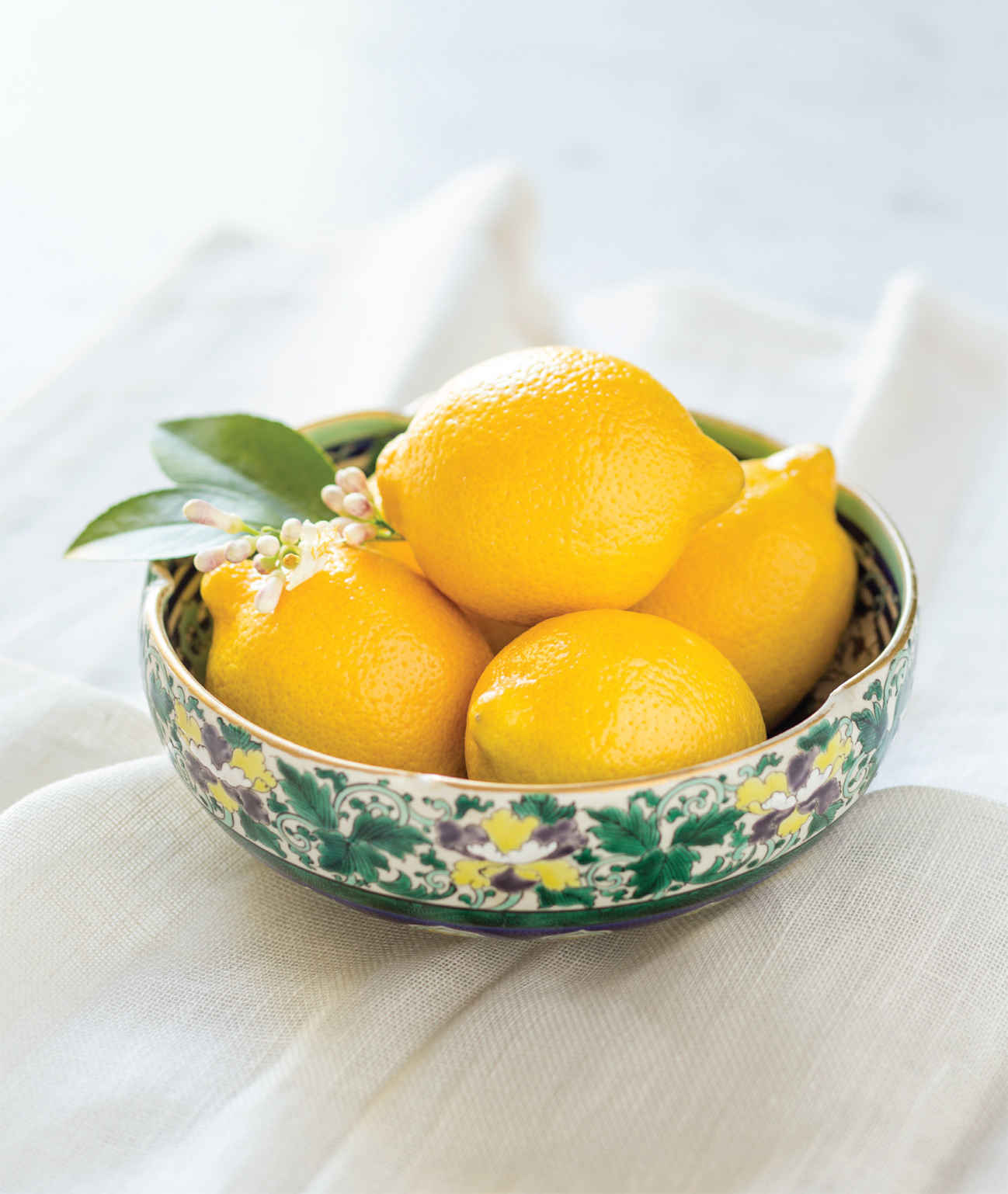Copyright 2015 by Ellen Jackson
All rights reserved. No portion of this book may be reproduced or utilized in any form, or by any electronic, mechanical, or other means, without the prior written permission of the publisher.
Published by Sasquatch Books
Editor: Susan Roxborough
Project editors: Michelle Hope Anderson and Em Gale
Photographs: John Valls
Trade paperback design: Joyce Hwang
Illustrations: Joyce Hwang
Food styling: Ellen Jackson
Copy editor: Diane Sepanski
Library of Congress Cataloging-in-Publication Data is available.
eBook ISBN: 978-1-57061-983-0
Trade Paperback ISBN: 978-1-55788-061-1
Hardcover ISBN: 978-1-57061-982-3
Sasquatch Books
1904 Third Avenue, Suite 710
Seattle, WA 98101
(206) 467-4300
www.sasquatchbooks.com
v3.1
contents
recipe list
introduction
I was first seduced by a lemon at the tender age of six. A lemon stick, to be exact. A signature item of the annual FlowerMart in Baltimore, lemon sticksa peppermint stick unceremoniously jammed into a lemonare a staple of the citys springtime fairs and festivals. I drew the juice of my lemon up through the porous peppermint candy, smitten with the fruits bitterness and the way it made my entire mouth pucker. I was in lemon love.
Lush-leaved lemon trees are as common as backyard swimming pools in California, where we moved when I was nine. Throughout the year, the air is perfumed with their scent, especially that of the thin-skinned, marigold-yellow Meyer lemon. There are rough-skinned, egg-shaped Eureka and Lisbon lemons too, in shades of pale yellow and green. But their sunny appearance belies whats insidea fruit nearly impossible to eat, as the Peter, Paul and Mary song goes: Lemon tree, very pretty, and the lemon flower is sweet, but the fruit of the poor lemon is impossible to eat.
A lemons unapologetic aciditysharp enough to create a honeycomb tunnel from one end of my peppermint stick to the otherimparts an intense. Whole lemonspreserved, pickled, pureed, saltedbecome delicious condiments, their sourness subdued by the similarly bold flavors of the Middle East and Southeast Asia. Strips of lemon peel garnish cocktails and infuse the contents of simmering pots with potent lemon essence. Though I am committed to cooking primarily with ingredients that grow close by and are in season, Ill make an exception for lemons without hesitation.
Lemons are always available, but you may have noticed that citrus is best in the winter months, when its presence in a rich dish is most dramatically transformative and balancing. The strong, clear flavor of lemons cuts through the heaviness of the fatty foods we indulge in during the holidays, and the best marmalade is made with winter fruit. But lemons have an insistent personality that allows them to play a leading yet complementary role throughout the year, when paired with more delicate ingredients such as spring vegetables, summer berries, and eggs and cream.
So what qualifies a dish for inclusion in a lemon cookbook? That was something I asked myself often when developing these recipes. Some contain entire lemonspeel, pulp, and pithannouncing proudly, I am lemon, hear me roar. Others get plucky flavor from the fruits zest and its essential oils. Still others are remarkably enhanced by a simple, judicious squeeze of lemon. Refreshing and versatile, lemons have a place in our drinks, on our pizzas, and at our breakfast tables. Zest and juice them, yes, but roast, grill, and preserve them too. And when spring comes around, pierce one with a peppermint stick; I guarantee itll make you puckerand smile.
a lemon primer
A lemon is a lemon is a lemon, right? Not exactly. For all their ubiquity and uniformity, a closer look reveals that lemons come in different varieties, shapes, and sizes. Some are small and juicy, while others have thick jackets that hide surprisingly tasteless, juiceless pulp. A lemon can be used from the inside out, each part bringing its own unique qualities to your cooking and baking. Read on for tips on choosing the best lemon, figuring out what it will yield, and getting the most from it.
Lemon Varieties
Nearly 95 percent of the lemons grown in the United States come from California and Arizona, with the balance from Florida. Although there are few opportunities for most of us to enjoy a truly local lemon, theres a source on either end of the country, and theyre available year-round. The two main lemon varieties, Eureka and Lisbon, are nearly identical in appearance, large and egg shaped with finely pitted skin. The only way to tell them apart is the time of year: Eurekas are a summer variety, and Lisbons are plentiful in the fall.
Meyer lemons are a cross between a lemon and an orange or tangerine. Floral and very aromatic, their juice is sweeter and should be used in combination with regular lemon juice if youre looking to add acidity to a recipe.
Lemons Are Good for You
When it comes to natural health benefits, lemons lead the pack. They contain unique flavonoid compounds that have antioxidant and anti-cancer properties, and are valued for their antibiotic effects.
In addition to containing a multitude of phytonutrient benefits, lemons are a source of other essential nutrients including vitamin A, beta-carotene, calcium, magnesium, folate, phosphorous, and potassium, many of which are contained in its peel. They are especially rich in vitamin C, one of the most important antioxidants found in food. Vitamin C is essential for maintaining a fully functional immune system, aiding digestion, balancing the bodys pH levels, fighting tumors, and helping wounds to heal more quickly.
How to Choose a Lemon
Choosing a fresh, juicy lemon isnt about finding the one with the most vibrantly colored skin. Instead, look for fruit with an allover natural sheen, indicating that the lemon has retained its essential oil. The skin should be free of soft spots and excessive texture or pitting, and the fruit should be plump and feel heavy. Though you might guess that the weight is in the juice, its actually in the sugar. Ripeness in citrus fruit is measured by sweetness, using the Brix/acid ratio, better known for measuring the sugar in wine grapes.
Because their skin is porous, lemons absorb whatever theyve been sprayed with. For that reason alone, its worth seeking out organic lemons. They tend to be thinner skinned and juicier than the larger conventional lemons, which are often dyed for even color and coated with wax. In my experience, grocery stores often carry two-pound bags containing eight organic lemons that rarely end up being more expensive than those for sale by the each.
If you cant find organic lemons, wash the fruit well in lightly soapy warm water with a soft vegetable brush.
Its All in the Zest
The skin of the lemoncommonly referred to as the zestis the source of its potent flavor, while the juice contains the tart, acidic qualities not found in the fruits jacket. Use zest if you want to infuse your food and cocktails with intense, bright lemon essence.














